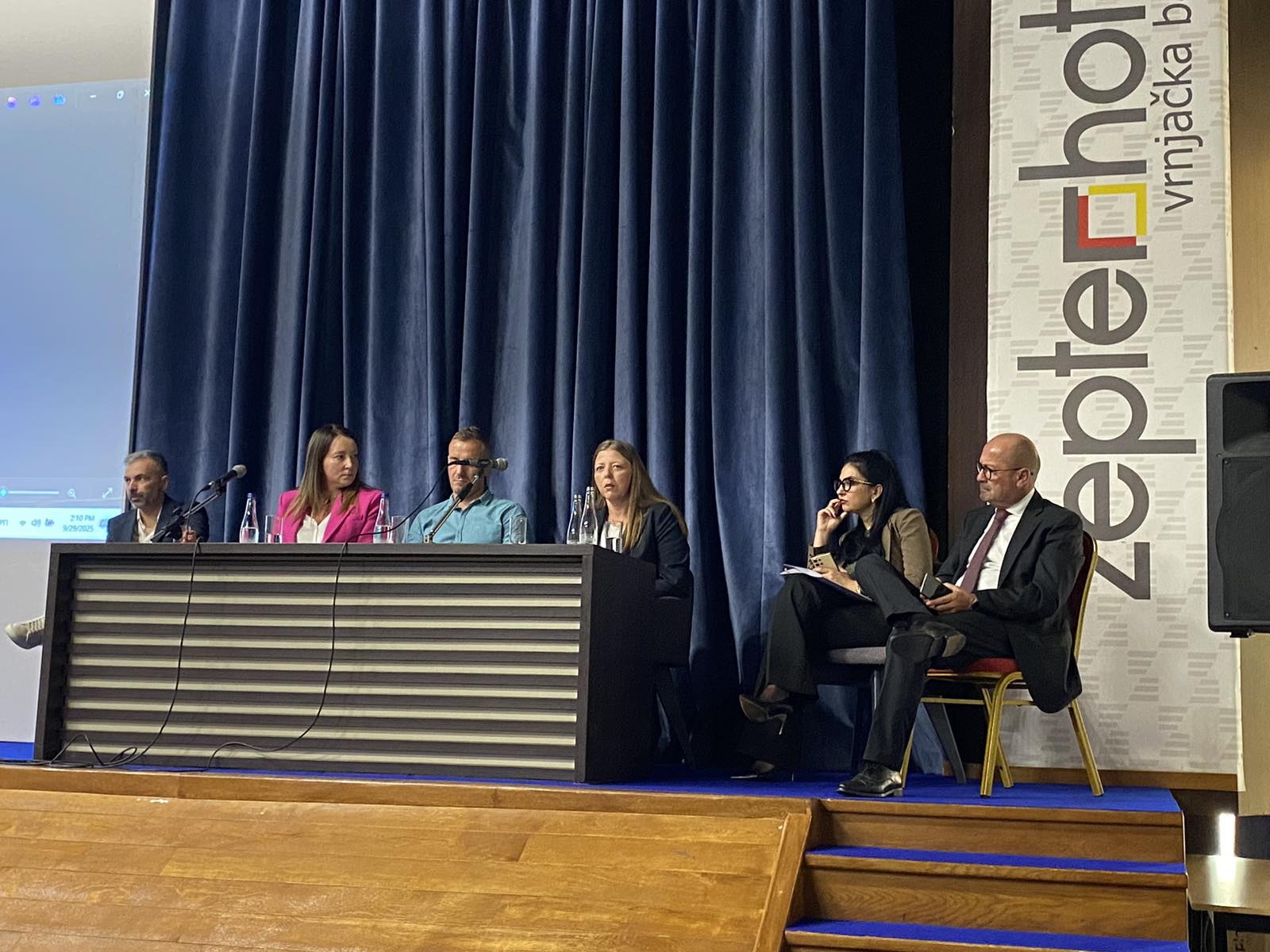Hotline: +381 61 63 84 071
When the media forgets ethics, victims suffer again

When the media forgets ethics, victims suffer again - Atina on the responsibility of the system toward victims of human trafficking
Bojana Nakić, representative of NGO Atina, participated in the National conference on social protection titled “Social inclusion in the function of preventing human trafficking”, held on September 29–30, 2025, in Vrnjačka Banja.
The conference was organized by the Association of Centers for social work of Serbia, the Chamber of social protection, and the Association of social workers of Serbia, with financial support from GIZ.
On the first day of the event, Bojana Nakić, representing NGO Atina, presented a case study showcasing good practice in multisectoral cooperation in combating human trafficking, through a concrete case in which a group of perpetrators was sentenced to over 50 years in prison. Other panelists included Irena Radivojević from the Higher public prosecutor’s office in Niš; Miroslav Jovanović and Sanja Savić from the Center for the protection of victims of human trafficking; Dejan Milosavljević from the Niš police department; and Nenad Simić, Head of the Office for coordination of activities in combating human trafficking and National coordinator for combating human trafficking.
The conference gathered around 400 professionals from Serbia’s social protection system, who exchanged experiences and suggestions for improving cooperation between institutions and civil society organizations.
In her address, Bojana emphasized the importance of specialized NGOs as essential members of multisectoral teams, noting that this example of successful cooperation also revealed numerous systemic challenges. Despite institutional obstacles and a lack of coordination, it was the joint dedication and genuine engagement of all stakeholders that ultimately led to justice for the victim.
“Although this case demonstrates effective cooperation, it also exposes many weaknesses of the system, from underdeveloped intersectoral communication to the absence of continuous institutional support for victims. That is why this example was presented both as a good and bad practice, to open space for learning and improving collaboration among all actors involved in protecting victims of human trafficking,” Nakić highlighted.
She reminded participants that NGO Atina has been fighting human trafficking for 22 years, providing long-term, comprehensive, and trauma-informed support to victims across the entire territory of Serbia. Each year, Atina works with around 200 individuals, approaching every case holistically, not viewing survivors merely as witnesses or victims within the legal system, but as persons deserving continuous support and recovery.
Speaking about the specific case, Bojana emphasized that a large number of professionals were involved in supporting the victim, including social workers, psychotherapists, supervisors, and field workers. Over three years, more than 30 field visits were conducted. With Atina’s consistent support, the survivor managed to endure a lengthy court process and begin rebuilding her life, despite ongoing pressures and threats from the perpetrators’ families.
“Even after the verdict was delivered, the threats and intimidation from the perpetrators’ families did not stop. This case demonstrates that ensuring safety and providing long-term support to victims remains essential even after the legal process ends, because trauma and fear do not vanish with a court ruling. Atina continues to stand by the survivor and provide her with ongoing support at every step,” Nakić emphasized.
During the legal proceedings and recovery process, the survivor’s grandmother played an exceptional role, a woman who had raised her and remained by her side throughout the ordeal. Her presence in the courtroom and unwavering support serve as a potent reminder that behind every survivor stands a network of people who share the burden, pain, and fight for justice.
Bojana also underscored the need for specialized organizations and tailored programs that address victims’ needs, for sensitized victim lawyers, and for institutional spokespersons who would prevent secondary victimization in the media. She emphasized the importance of strengthening multisectoral cooperation, without which comprehensive support and effective recovery for survivors cannot be achieved.
Special attention was drawn to the responsibility of the media, as unethical reporting in this case led to secondary victimization of the survivor.
“The traffickers hurt her, and the media finished the job with their reporting,” Bojana said, stressing the need for institutional spokespersons and media training on ethical reporting in cases of human trafficking.
Such gatherings remind us that the fight against human trafficking is not the task of a single institution but a shared responsibility.
“When we act together, with trust, understanding, and a willingness to learn from one another, we build a system that restores dignity to victims and humanity to society,” said Bojana Nakić in her concluding remarks.
Events like this serve as an essential opportunity to confront real challenges from the field and to strengthen the understanding that only through continuous cooperation, dialogue, and mutual trust can we create a system that truly protects victims of human trafficking.












 FACEBOOK
FACEBOOK TWITTER
TWITTER YOUTUBE
YOUTUBE